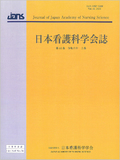Japanese
English
- 販売していません
- Abstract 文献概要
- 参考文献 Reference
要旨
目的:重症心身障害児(者)(重症児者)施設の看護師を対象に,離職意思と倫理的悩みとの関連,およびワーク・エンゲイジメント(WE)の媒介効果を検証する.
方法:58か所の重症児者施設の看護師を対象に,個人特性,離職意思,倫理的悩み,WEを尋ねるWeb調査を実施した.分析は記述統計,相関分析,構造方程式モデリング(SEM)を行った.SEMでは仮説モデルを構築した後に適合度指標を基にモデルの改良を行なった.
結果:144名を分析対象とした.相関分析では離職意思は倫理的悩みとは正の相関が,WEとは負の相関が示された.SEMでは仮説の通り倫理的悩みは看護師の離職意思を高め,WEがその関連を部分的に媒介し倫理的悩みから離職意思の影響を軽減した.
結論:重症児者を看護する看護師の人材確保のためには,倫理的悩みを軽減するアプローチの他にも,WEを高める組織作りが重要と示唆された.
Purpose: The purpose of this study was to examine the relationship between moral distress and turnover intentions, as well as the mediating effect of work engagement(WE) among nurses working in facilities for patients with severe motor and intellectual disabilities(SMID).
Methods: A Web-based questionnaire was administered to nurses working with 58 facilities, asking about personal characteristics, turnover intentions, moral distress, and WE. The analysis consisted of descriptive statistics, correlation analysis of each variable, and structural equation modeling(SEM).
Results: Analysis included 144 datasets. Correlation analysis revealed that turnover intention was significantly positively related to Moral Distress and significantly negatively related to WE. In the SEM analysis, as hypothesized, Moral Distress increased the turnover intentions of nurses caring for patients with SMID, and WE mediated and buffered this association.
Conclusion: In addition to approaches to reduce Moral Distress, it is important to create an organization that enhances WE to improve the retention of nurses who care for patients with SMID.
Copyright © 2024, Japan Academy of Nursing Science. All rights reserved.


